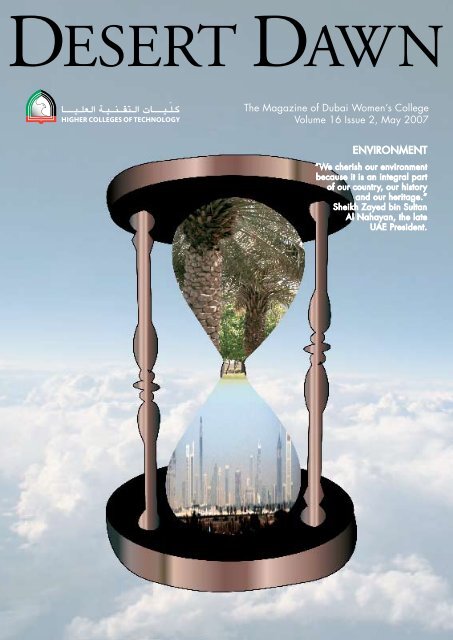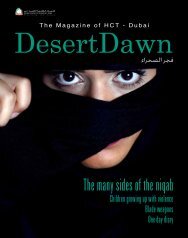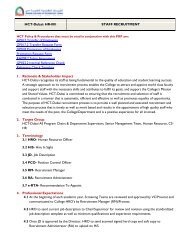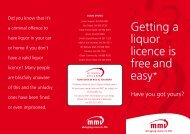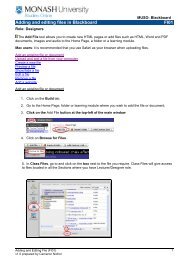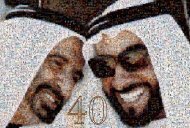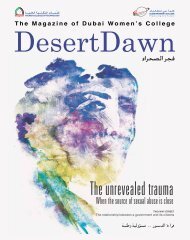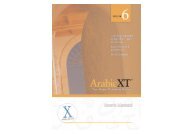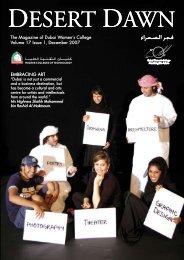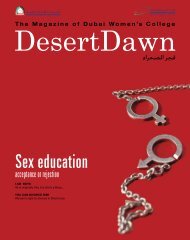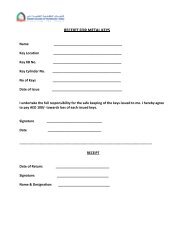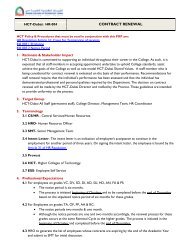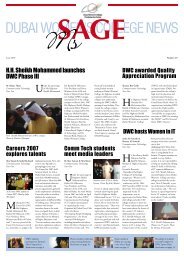The Magazine of Dubai Women's College Volume 16 Issue 2, May ...
The Magazine of Dubai Women's College Volume 16 Issue 2, May ...
The Magazine of Dubai Women's College Volume 16 Issue 2, May ...
Create successful ePaper yourself
Turn your PDF publications into a flip-book with our unique Google optimized e-Paper software.
DESERT DAWN<br />
<strong>The</strong> <strong>Magazine</strong> <strong>of</strong> <strong>Dubai</strong> Women’s <strong>College</strong><br />
<strong>Volume</strong> <strong>16</strong> <strong>Issue</strong> 2, <strong>May</strong> 2007<br />
ENVIRONMENT<br />
“We cherish our environment<br />
because it is an integral part<br />
<strong>of</strong> our country, our history<br />
and our heritage.”<br />
Sheikh Zayed bin Sultan<br />
Al Nahayan, the late<br />
UAE President.
CONTENTS PAGE<br />
02 DWC News & Views<br />
04 Eco-friendly Metro<br />
06 Collective Green Efforts<br />
08 <strong>The</strong> Ugly Truth<br />
09 Your Decision<br />
10 Green Education for UAE children<br />
12 Victims <strong>of</strong> air pollution<br />
14 Global Problem<br />
<strong>16</strong> Environmental Impressions<br />
18 Towards reducing air pollution<br />
19 Arabian Oryx<br />
20 Heavy Consumption<br />
22 Working with the Media<br />
24 <strong>Dubai</strong> Creek: past and present<br />
27 Water = Life<br />
28 Arabic Stories<br />
Editors:<br />
Afra Atiq<br />
Asma Ahmed<br />
Cover Design:<br />
Afra Atiq<br />
Production Managers:<br />
Eman Ghazal<br />
Nourah Abdullah<br />
Advertising Coodrinators:<br />
Shaikha<br />
Asma Ahmed<br />
Photo Editors:<br />
Ayesha Al Muhairi<br />
Sahar Al Khatib<br />
Thanks:<br />
Amina McCulloch<br />
Andrew O’Sullivan<br />
Dr. Hanan Hairab<br />
Fraser Macdonald<br />
Heba Al Hadary<br />
Kevin Kempin<br />
Marc Pelletreau<br />
Margo Tummel<br />
Sama Al Khaldi<br />
Steve Turney<br />
Yomna Kamel<br />
<strong>The</strong> Publications Committee<br />
Publisher:<br />
Dr. Howard Reed<br />
Opinions do not necessarily represent the views<br />
<strong>of</strong> Desert Dawn, the Communication Technology<br />
Department, its faculty, DWC or its <strong>of</strong>ficials.<br />
Desert Dawn welcomes submissions from students.<br />
Not all submissions may be pronted, and submissions<br />
may be edited for space, style and content.<br />
Desert Dawn is produced by <strong>Dubai</strong> Women’s<br />
<strong>College</strong>, Communication Technology Department<br />
and printed by International Printing Pres, IPP.<br />
Desert Dawn welcomes letters to the editor,<br />
addressed to Desert Dawn, PO BOX <strong>16</strong>062, <strong>Dubai</strong><br />
or email your letters to desertdawn@dwc.hct.ac.ae<br />
Copyright <strong>Dubai</strong> Women’s <strong>College</strong>, HCT.<br />
Now online at:<br />
www.dwc.hct.ac.ae/commtech/publications
EDITOR’S NOTE<br />
While the country has been progressing steadily<br />
on the path <strong>of</strong> growth and development, the issue<br />
<strong>of</strong> sustainable development has become a concern<br />
for the UAE government, non-governmental<br />
sectors and environmentalists. Sustainable<br />
development is defined as “the process <strong>of</strong><br />
balancing the need <strong>of</strong> humans for economic and<br />
social development with the need to protect the<br />
natural and built environment.” Under the theme,<br />
Development and Environment, the new issue <strong>of</strong><br />
Desert Dawn comes to reflect concerns <strong>of</strong> the new<br />
generation <strong>of</strong> Emirati women about their country’s<br />
sustainable development. A group <strong>of</strong> 15 female<br />
students studying Communication Technology<br />
at <strong>Dubai</strong> Women’s <strong>College</strong> worked together<br />
researching, reporting, writing, designing and<br />
producing a new issue <strong>of</strong> Desert Dawn.<strong>The</strong>re are<br />
so many things to say about this issue <strong>of</strong> Desert<br />
Dawn’s theme, development and environment.<br />
As young Emiratis and as editors, it is our job<br />
to ensure that light is shed on the environmental<br />
issues surrounding development and to dig deep<br />
enough to find real solutions.We seek to explore<br />
previously ignored environmental issues and give<br />
them the representation they deserve by publishing<br />
high quality objective stories.This issue explores<br />
local, regional and international environmental<br />
issues. In the new edition <strong>of</strong> Desert Dawn, we<br />
provide our readers with truth and harsh reality<br />
<strong>of</strong> the state <strong>of</strong> the environment. Stories include<br />
global warming, water and air quality as well as<br />
environmental awareness education. After three<br />
straight issues on Emiratisation and lots <strong>of</strong> positive<br />
feedback, Desert Dawn continues to grow and<br />
improve. We are proud to present an all-new<br />
edition <strong>of</strong> the publication.We hope that this issue<br />
will help our readers think differently about the<br />
environment and development.<br />
Afra Atiq Asma Ahmed<br />
Asma Ahmed Afra Atiq Shaikha Bukhashem<br />
Hafsa Al Mutawa Shamma Abu Nawas Ayesha Al Muhairi<br />
Sahar Al Khatib Moza Ahmed<br />
Amira Saeed<br />
Eman Ghazal<br />
Aisha Binhammad<br />
Nourah Abdullah<br />
Athija Thani Shahd Khaled<br />
Jawaher Ahmed<br />
Margo Tummel<br />
Graphic Design<br />
Dr. Hanan Hairab<br />
Department Supervisor<br />
Yomna Kamel<br />
Journalism
Sheikh Hamdan Bin Mohammed Bin Rashid Al Maktoum awards <strong>Dubai</strong> Qualuity Appreciation Program to DWC.<br />
<strong>Dubai</strong> Women’s <strong>College</strong> wins <strong>Dubai</strong> Quality Appreciation Program<br />
His Highness Sheikh Hamdan bin Mohammed bin Rashid Al Maktoum, Chairman <strong>of</strong> <strong>Dubai</strong><br />
Executive Council, and His Highness Sheikh Maktoum bin Mohammed bin Rashid Al<br />
Maktoum, awarded <strong>Dubai</strong> Women’s <strong>College</strong> (DWC) with <strong>Dubai</strong> Quality Appreciation Program<br />
(DQAP) in recognition for its excellence in education. <strong>The</strong> award ceremony was held on March<br />
14th at the Grand Hayat Hotel where 13 companies from different industries in <strong>Dubai</strong> won the<br />
<strong>Dubai</strong> Quality Award (DQA) . DWC is one <strong>of</strong> two colleges, along with <strong>Dubai</strong> Medical <strong>College</strong><br />
for Girls, which won the DQAP that is provided to organizations committed to excellence and<br />
are currently implementing quality initiatives within their organization.<br />
Insight <strong>Dubai</strong> 2007<br />
More than 50 Emirati and international<br />
students participated in Insight <strong>Dubai</strong>,<br />
an annual conference hosted and organized<br />
by <strong>Dubai</strong> Women’s <strong>College</strong>.<br />
<strong>The</strong> third Insight <strong>Dubai</strong>, held from April<br />
8th to 12th, attracted students from all over<br />
the world who came together to discuss l<br />
eadership, global politics and cross-cultural<br />
communication in interactive sessions. <strong>The</strong><br />
conference also <strong>of</strong>fered two main workshops:<br />
one on Sharia’ (Islamic) law and the other<br />
on equal representation <strong>of</strong> women.<br />
Student Parliament election<br />
<strong>Dubai</strong> women’s <strong>College</strong> held its second<br />
student parliament election on April 19th.<br />
Ayesha Shukrallah, a year two Pharmacy<br />
student, took the first position as President<br />
followed by Asma Ahmed, a year two<br />
Communication Technology student, as<br />
a Vice President and Ayesha Al Marri,<br />
a year two Pharmacy student, took the<br />
third position as a secretary.<br />
DWC and international students participate<br />
in Insight <strong>Dubai</strong> Group<br />
Ayesha Shurallah, year two pharmcy student,<br />
elected president <strong>of</strong> DWC Student Parliament.<br />
photo by: Insight orvganizers provided by: Mariam Al Shurafa<br />
photo by: Mariam Al Shurafa
02 > NEWS & VIEWS<br />
H.H Shiekh Mohammed bin Rashid Al Maktoum<br />
and H.E Nahayan bin Mubarak Al Nahayan attend<br />
DWC Grand opening<br />
Counseling Arabia<br />
<strong>Dubai</strong> Women’s <strong>College</strong> hosted the fifth<br />
annual conference <strong>of</strong> Counseling Arabia. <strong>The</strong><br />
conference took place on the 18th and 19th<br />
<strong>of</strong> April 2007 with the attendance <strong>of</strong> His<br />
Excellency Ahmed Humaid Al Tayer,<br />
Chairman <strong>of</strong> Emirates Nationals Development<br />
Program Board <strong>of</strong> Trustees and Azza Al<br />
Sharhan, Director <strong>of</strong> Emirates Nationals<br />
Development Program.<br />
Letters to the Editor<br />
photo by: Ayesha Al Muhairi<br />
H.H. Sheikh Mohammed inaugurates<br />
DWC Phase III<br />
Under the patronage <strong>of</strong> His Highness Sheikh<br />
Mohammed bin Rashid Al Maktoum, Vice<br />
President and Prime Minister <strong>of</strong> the UAE<br />
and Ruler <strong>of</strong> <strong>Dubai</strong>, <strong>Dubai</strong> Women’s <strong>College</strong><br />
(DWC) announced the inauguration <strong>of</strong> the<br />
phase III <strong>of</strong> the college campus on March 28th,<br />
2007. His Highness Sheikh Mohammed toured<br />
<strong>Dubai</strong> Women’s <strong>College</strong> accompanied by His<br />
Highness Sheikh <strong>May</strong>ed bin Mohammed bin<br />
Rashid Al Maktoum, His Excellency Sheikh<br />
Nahayan Bin Mubarak Al Nahayan, Minister<br />
<strong>of</strong> Higher Education, Chancellor <strong>of</strong> Higher<br />
<strong>College</strong>s <strong>of</strong> Technology, and Dr. Howard Reed,<br />
Director <strong>of</strong> <strong>Dubai</strong> Women’s <strong>College</strong>.<br />
His Excellency Ahmed Humaid Al Tayer<br />
in Counseling Arabia<br />
Your Excellency,<br />
Thank you for your letter dated December, 2006 along with a complimentary<br />
copy <strong>of</strong> Desert Dawn.<br />
We found your publication very informative and useful. Hence, we shall display<br />
it in our reference library for the users <strong>of</strong> our library and they will benefit from<br />
this publication.<br />
We are enclosing herewith the latest copy <strong>of</strong> our monthly magazine “ Al-<br />
Tijarah” for your kind perusal.<br />
Yours faithfully,<br />
Saeed Obaid Al Jarwan<br />
Director General<br />
Sharjah Chamber <strong>of</strong> Commerce & Industry<br />
photo by: Mariam Al Shurafa
<strong>The</strong> project is also an environment friendly<br />
alternative to cars and busses and will help<br />
reduce pollution in the city. In response to<br />
several studies on eco-friendly modes <strong>of</strong><br />
transportation, done inside and outside the<br />
country, the Roads and Transport Authority<br />
in <strong>Dubai</strong> (RTA) has a 30-billion dirham strategic<br />
plan to deal with the current situation and<br />
the future challenges. With a track network<br />
<strong>of</strong> 318 km by 2020 that would carry 200,000<br />
commuters per hour, the <strong>Dubai</strong> Metro project<br />
has been launched. According to RTA, <strong>Dubai</strong><br />
Metro provides an alternative mode <strong>of</strong><br />
transport that will ease traffic congestion,<br />
reduce traffic-borne pollution and improve air<br />
quality; thereby creating a better environment<br />
for the city’s residents and visitors. <strong>The</strong> metro<br />
will not only enhance mobility within the city,<br />
it will also reduce dependency on cars and as<br />
a result the total health care costs attributed<br />
to air pollution will decrease approximately<br />
by one million dirham per year. Studies for<br />
developing the metro system started back<br />
in 1997. <strong>The</strong> study was completed during<br />
1997-2000; it has concluded that <strong>Dubai</strong> could<br />
not rely solely on its current roads transport<br />
systems to meet future traffic demands. <strong>The</strong><br />
study suggested that there was a definite need<br />
for a transit system to ease congestion and<br />
adoption <strong>of</strong> practical transport policies that<br />
would focus on traffic regulation and<br />
protection <strong>of</strong> the environment. “It is<br />
anticipated that by 2017 nearly 1.2 million<br />
people will use the trains daily, with 17,000<br />
passengers at peak hours and 355 million<br />
people a year. With a carrying capacity <strong>of</strong><br />
up to 50,000 passengers per hour, the<br />
mass transit system will be able to meet<br />
public demand until well beyond 2020,”<br />
Huddersfield’s study anticipates.<br />
Metro Construction<br />
Abdureedha Abu Al Hassan, the Director <strong>of</strong><br />
Planning and Design Department, Rail Agency<br />
– RTA, says, <strong>Dubai</strong> Metro consists <strong>of</strong> two lines<br />
(first and second stage), and will be followed<br />
with extra future lines (purple, blue etc.).<br />
<strong>The</strong> Red Line will be in operation by<br />
September 9, 2009, whereas the Green Line<br />
will be functioning on March 10, 2010. <strong>The</strong><br />
Purple Line is expected to be ready by 2012<br />
and the Blue Line is expected to operate before<br />
2015. Abdureedha says.<br />
Environmental Concerns<br />
During construction, <strong>Dubai</strong> government has<br />
formed a set <strong>of</strong> laws to support the environment,<br />
using purification methods in order to have<br />
unpolluted surroundings. Abdulmajid Al-Khaja,<br />
the CEO <strong>of</strong> Rail Agency, RTA, says, “<strong>The</strong><br />
necessary precautions are taken to protect the<br />
environment during construction and the Health,<br />
Quality, Safety and Environment Department<br />
(HQSE) closely monitors the effect <strong>of</strong> these<br />
activities on the environment on short and long<br />
term basis.” Equipment failing to meet the sound<br />
limits is only allowed to function throughout<br />
late morning hours and not at night. “<strong>The</strong><br />
contractor has been asked to take precautions<br />
to protect the surrounding environment. This<br />
not only ends at the construction sites, but<br />
also while manufacturing and delivering the<br />
rolling stock and during operations,” he adds.<br />
<strong>The</strong> quality Safety Environment and Health<br />
Department <strong>of</strong> the rail agency has established air<br />
sanitization systems and monitors to calculate the<br />
gas levels. Manufacture and construction waste<br />
will be taken and positioned in containers, which<br />
will be emptied frequently. “<strong>The</strong> <strong>Dubai</strong> Metro is<br />
one <strong>of</strong> UAE’s most prestigious projects which will<br />
further enhance the Emirate’s image,” says<br />
Abdermajid.<br />
Underground station. Road cross over bridge from a station.<br />
Provided by: RTA<br />
Provided by: RTA
04 > FEATURE<br />
“An eco-friendly<br />
metro will be<br />
a solution to<br />
several problems<br />
because one<br />
lane <strong>of</strong> metro<br />
equals up<br />
to 60 road<br />
lanes,” states<br />
University <strong>of</strong><br />
Huddersfield’s<br />
DUBAI METRO:<br />
Eco Friendly Solution<br />
TEXT > Shahd Khaled, Ayesha AlMuhairy, Jawaher Bufaroosha<br />
& Mashael Hashim<br />
More than a million vehicles are on <strong>Dubai</strong>’s roads, making an<br />
average <strong>of</strong> 3.1 million trips each day. <strong>The</strong> annual growth rate <strong>of</strong><br />
vehicles in <strong>Dubai</strong> is 12% and the growth pattern is likely to continue<br />
and the number <strong>of</strong> trips is expected to go up to a staggering 13.1<br />
million trips per day.<br />
Exterior Design <strong>of</strong> the metro.<br />
study. “<strong>Dubai</strong> is now an example for traffic congestion<br />
due to increasing numbers <strong>of</strong> cars. Recent<br />
statistics assert that there are 465,000 vehicles<br />
registered in the emirate, in addition to 5,000<br />
taxi cars. <strong>The</strong>re is a significant number <strong>of</strong><br />
residents <strong>of</strong> neighboring emirates who are<br />
working in the city”, reveals a study on<br />
sustainable transportation in the UAE by<br />
Maha Al-Zubaidi and Khalid Sabie from<br />
the University <strong>of</strong> Huddersfield in the UK.<br />
Vehicles are to blame for 80% <strong>of</strong> pollution,<br />
emissions <strong>of</strong> harmful gases pose health and<br />
environmental hazards. Car emissions need<br />
to be reduced to a degree that guarantees<br />
unpolluted air and a hygienic environment,<br />
the study stresses. Huddersfield’s study also<br />
suggests that “an eco-friendly metro will be<br />
a solution to several problems because one<br />
lane <strong>of</strong> metro equals up to 60 road lanes.”<br />
<strong>The</strong> benefits <strong>of</strong> the project would include<br />
reducing the number <strong>of</strong> cars on <strong>Dubai</strong>’s roads,<br />
facilitating traffic and increasing road safety.<br />
Provided by: RTA
eneficial relationships with private sector<br />
and non-pr<strong>of</strong>it associations.” <strong>The</strong> Environment<br />
and Health Educational Office in <strong>Dubai</strong><br />
Municipality supports local, regional and<br />
international NGOs working in <strong>Dubai</strong> as it is<br />
well aware <strong>of</strong> the importance <strong>of</strong> enhancing<br />
the voluntary activities among <strong>Dubai</strong> nationals<br />
and expatriates. “<strong>The</strong>se NGOs, besides the<br />
private sector, contribute successfully to our<br />
major environmental initiatives and campaigns,<br />
and we do provide unlimited support to enable<br />
them to participate efficiently,” he says.<br />
“Together we celebrate the major environmental<br />
occasions and days, participate in the major<br />
events in <strong>Dubai</strong>, specific programs and<br />
campaigns that target community members.<br />
We also support the activities that are organized<br />
by <strong>Dubai</strong> Municipality’s other departments<br />
such as Clean Up the World Campaign,<br />
Municipalities Week and JUTE UP (Reduce<br />
using plastic bags in shopping) campaign.<br />
About the role <strong>of</strong> the private sector, Mohammad<br />
Musabeh, the manager <strong>of</strong> Emirates Ventures,<br />
says, “We are a group <strong>of</strong> young Emirati men,<br />
and we do a lot <strong>of</strong> environmental activities.<br />
One <strong>of</strong> the events that we did was Clean the<br />
World campaign during the years 2001, 2002,<br />
and 2003. Our mission was to dive into <strong>Dubai</strong><br />
Creek and clean the seabed. In addition, we did<br />
small activities on the shore <strong>of</strong> <strong>Dubai</strong> Creek.<br />
People are positively responding to our activities<br />
and campaigns.”<br />
In 2005 Emirates Ventures started diving<br />
in Rashid Port and its divers cleaned the<br />
seabed. Mohammed says, “We are working<br />
on a new project where every month, during<br />
a certain weekend, we take students from<br />
schools, colleges and universities to Diba<br />
in Fujairah. We teach them about the<br />
environment and we organize environmental<br />
activities.” <strong>Dubai</strong> government helps in everything<br />
and Emirates Ventures receives financial<br />
support as well as moral support. “Senior<br />
government <strong>of</strong>ficials attend our activities. We<br />
received certificates <strong>of</strong> appreciation for all the<br />
work we have been doing. We also receive good<br />
media coverage.” Laila Al-Hassan, from the<br />
Environment Education and Awareness Division<br />
<strong>of</strong> Abu Dhabi Environment Agency, says,<br />
“<strong>The</strong> Government and the private sectors are<br />
partners. When it comes to environmental<br />
protection, it is everyone’s responsibility and<br />
these two sectors support each other.<br />
In the years 2005 and 2006, the agency took<br />
3,000 students on 115 educational field trips.<br />
During these trips, the concepts that were<br />
explained to students included the effects<br />
<strong>of</strong> waste such as plastics on the terrestrial<br />
environment, marine environment, mangroves,<br />
and wetland ecology. Laila believes that the<br />
results <strong>of</strong> this cooperation are positive. “<strong>The</strong><br />
demand for educational environmental field<br />
trips from schools has increased over the years.<br />
We are noticing a change in attitude in the<br />
public. <strong>The</strong>y are becoming more interested<br />
in the environment. However, behavior will<br />
take longer to change but we are very<br />
hopeful,” she says.<br />
Another non-governmental association is the<br />
Friends <strong>of</strong> Kerala, which is an Indian NGO<br />
with branches across the country. <strong>The</strong> association<br />
works hand in hand with <strong>Dubai</strong> Municipality<br />
and other environmental authorities in the<br />
country. Arun Bhaskara Pillai, a member in<br />
the association, says, “<strong>The</strong> association has<br />
around 200 members, and we have branches<br />
in <strong>Dubai</strong>, Abu Dhabi, Sharjah, and Ajman.<br />
<strong>The</strong> association organises seminars, awareness<br />
classes, and campaigns. “With both <strong>Dubai</strong><br />
Municipality and EEG, we have done many<br />
campaigns, where more than 150 volunteers<br />
cleaned the Rashidiya park area.” Arun still<br />
believes that they will not achieve their targets<br />
without cooperation with other non-<br />
governmental organizations. “I think that<br />
all what we do is not enough because it has<br />
to be done on a vast scale,” he says calling<br />
upon all concerned bodies to work together<br />
for a greener and cleaner environment.<br />
Young people participate in cleaning up activities.<br />
“<strong>The</strong><br />
Government<br />
and the<br />
private sectors<br />
are partners.<br />
When it<br />
comes to<br />
environmental<br />
protection,<br />
it is everyone’s<br />
responsibility<br />
and these two<br />
sectors support<br />
each other,”<br />
Laila Al-<br />
Hassan,<br />
from the<br />
Environment<br />
Education<br />
and Awareness<br />
Division <strong>of</strong><br />
Abu Dhabi<br />
Environment<br />
Agency, says.<br />
Provided by Friends <strong>of</strong> KSSP Association
06 > FEATURE<br />
COLLECTIVE<br />
Green Efforts<br />
TEXT > Sahar Al Khatib and Hafsa Al Mutawa<br />
A beautiful day on the beach, the air is clean and the sun is<br />
shining down on the water. You see 4-to 14-year-old children<br />
wearing white t-shirts with a green globe printed on it. <strong>The</strong>y are<br />
holding big bags and picking up the garbage <strong>of</strong>f the<br />
shores <strong>of</strong> the city’s beaches. Representatives from governmental<br />
and non-governmental organizations are helping the children and<br />
all are working together for a noble cause.<br />
This is a common scene here in <strong>Dubai</strong> that<br />
happens because <strong>of</strong> the cooperation between<br />
the governmental and non-governmental<br />
organizations that work hand in hand to keep<br />
the city clean and green.<br />
<strong>The</strong> Emirates Environmental Group is one<br />
<strong>of</strong> the leading non-governmental organizations<br />
that cooperates with the country’s public<br />
and private sectors for one noble cause: to<br />
protect the environment for the wellbeing<br />
<strong>of</strong> humankind. Habiba Al Marashi, Emirates<br />
Environmental Group chairperson, says,<br />
“Since we are a private group, we don’t get<br />
direct support from the government, only<br />
private associations. We usually do workshops<br />
about the environment and climate change<br />
and its effect. During all the events and activities<br />
we’ve done we have come to a conclusion<br />
that there is a great positive reaction from<br />
people.” Habiba is passionate about the<br />
environment and she is doing her best to help<br />
in protecting it, but she also strongly believes<br />
that to achieve desirable results, her group<br />
Diving in <strong>Dubai</strong> Creek to clean the sea bed.<br />
needs support from all concerned parties: the<br />
government and the public. “Taking care <strong>of</strong><br />
the environment is everyone’s responsibility<br />
and we have to be role models,” Habiba says.<br />
Mohammed Numan, an environment<br />
awareness <strong>of</strong>ficer with the Environment<br />
and Health Educational Office at <strong>Dubai</strong><br />
Municipality, says, “ <strong>Dubai</strong> Municipality is<br />
a leading governmental department that<br />
supports the role <strong>of</strong> the community associations<br />
in sustainable development. One <strong>of</strong> our strategic<br />
goals in <strong>Dubai</strong> municipality is building<br />
Provided by Friends <strong>of</strong> KSSP association.
YOUR DECISION<br />
By: Eman Ghazal<br />
Here, in the UAE, winter used to be the<br />
perfect season for people to go around and<br />
have a good time with their families and<br />
friends, but this is not the case any more.<br />
When I look through my bedroom window,<br />
I see a beautiful view <strong>of</strong> a great nature. I open<br />
the window and the awful reality shocks me.<br />
<strong>The</strong> only thing that I can hear and smell is<br />
noisy smoky air, so I close the window quickly.<br />
We watch many movies and documentaries,<br />
and sometimes we participate in many<br />
campaigns that concern air pollution or any<br />
other environmental issue, but do we have the<br />
courage to make the first step in order change?<br />
We do many things that may harm the<br />
environment, and we do these things without<br />
paying any attention to the negative results<br />
that these practices may do to the<br />
environment. <strong>The</strong> difference in air quality<br />
is very clear between <strong>Dubai</strong> and the other<br />
Emirates. For example, when we go away<br />
to visit someone or to spend a weekend<br />
break, we notice the difference in air smell<br />
and color, which means a difference in air<br />
quality for sure.<br />
Air pollution is not a small issue that can<br />
be delayed or ignored by individuals or governments.<br />
Traffic in <strong>Dubai</strong> has become<br />
a problem. <strong>The</strong> city’s transportation authority<br />
is doing a great effort to provide public<br />
transportations for people who are living here;<br />
yet the problem remains in the increasing<br />
number <strong>of</strong> cars. Personally, I prefer to use<br />
my own car for many reasons such as privacy<br />
or/and getting from A to B faster and easier.<br />
Industry also is growing in this region, which<br />
proves that UAE is not totally depending on<br />
oil anymore; because there are many alternative<br />
economical sources in this country.<br />
Unfortunately, industry has many bad effects<br />
not only on humans, but also on many other<br />
species, and that’s why many animals have<br />
disappeared from this region, and no longer<br />
found. To give an idea about air pollution<br />
effect on people, a simple example would help,<br />
a man spends his daytime in his workplace, in<br />
an indoor, crowded <strong>of</strong>fice, facing the pressure<br />
<strong>of</strong> finishing his job on time, the <strong>of</strong>fice is in<br />
a building which is located on Sheikh Zayed<br />
Road, one <strong>of</strong> the most crowded roads here<br />
in the UAE, would he get a chance to think<br />
about going and having a break in a nice place<br />
with clean air, and if he has the chance to<br />
think about it, would he be able to do it, when<br />
and where, and would he be able to make it<br />
before his break finishes? Questions that require<br />
each person to think about seriously and try<br />
to find an answer or most correctly a solution<br />
to stop or to be more credible, to reduce it<br />
albeit small. To sum up, air pollution has<br />
become a health issue, which concerns many<br />
people in UAE in general, and <strong>Dubai</strong> especially.<br />
Many habits need to change and some important<br />
decisions have to be taken. People in this<br />
country, decide whether a bright future<br />
is coming, or it would be something else!
08 > OPINION<br />
THE UGLY TRUTH<br />
Text: Athija Thani<br />
A recent environmental study revealed that per<br />
capita household waste has reached an average<br />
annual level <strong>of</strong> 725 kilos in <strong>Dubai</strong>. That is<br />
a huge amount, but the question is, why is<br />
that a huge amount? What led to the sudden<br />
increase? I believe that certain human practices<br />
and habits led to the increase in consuming<br />
all sorts <strong>of</strong> material, whether it is food, paper,<br />
water energy etc. In addition to this, the<br />
ignorance <strong>of</strong> people about the forthcoming<br />
consequences to their actions. Some people<br />
don’t even think that there maybe a reaction<br />
to what they initiated, but prefer to ignore<br />
it and deal with it some time later, when the<br />
situation goes worse. Yet that could be too late.<br />
In my opinion, I think people should realize<br />
the harm they are inflicting on the environment<br />
as well as themselves. It is quite surprising<br />
that some people don’t even know what the<br />
consequences are to their heavy consumption<br />
and how it can greatly affect our life sources<br />
because they have this idea that all is renewable<br />
and if not there is always the manufactured.<br />
I think that people with authority and power<br />
should raise awareness towards this issue and<br />
clarify all the misconceptions and mis-<br />
understandings people may have. Perhaps<br />
this step is an initiative as to provide an insight<br />
into the huge amount <strong>of</strong> impact we have on<br />
the environment. I agree that we have become<br />
consuming junkies to the extent we consume<br />
a lot <strong>of</strong> toilet paper! Laws have been laid down<br />
and fees have been implemented. Yet people<br />
ignore all this and continue! So I am wondering<br />
what really is going to stop the situation from<br />
crossing the red line. I have come to the point<br />
where I strongly agree that it is all about<br />
individual responsibility. All facts and figures<br />
are out there in addition to the ugly truth <strong>of</strong><br />
our own doings, bells are ringing. What’s left<br />
to be done is the decision <strong>of</strong> the individual,<br />
does he/she want to keep on going down this<br />
road or is this a time to rise to the occasion and<br />
a time for change that can greatly affect the<br />
living style and chances <strong>of</strong> survival for the next<br />
generation.
is the Tadweer Factory. <strong>The</strong>re is an upcoming<br />
competition about ‘<strong>The</strong> Desert in UAE’<br />
and ‘<strong>The</strong> Impact <strong>of</strong> Global Warming on<br />
Biodiversity’, Work by students will be submitted<br />
to the teachers and will be sent to <strong>Dubai</strong><br />
Municipality for evaluation.”<br />
“We have an environment week every year<br />
to encourage students to learn more about<br />
the environment and how to protect it from<br />
pollution and other negative impacts starting<br />
from home and school,” Nawal adds.<br />
Unfortunately, environmental studies are only<br />
taught in the science and biology books and<br />
not to all sections. It is not taught as an<br />
independent compulsory subject like biology<br />
or geography. However, some teachers believe<br />
it is good to keep it as an extra-curricular<br />
activity. “If we start teaching environmental<br />
studies as a compulsory subject to students in<br />
all grades, then I believe it will discourage them<br />
from understanding the environment and they<br />
will find it a boring subject,” says Nawal.<br />
Government Schools<br />
Many people believe that government schools<br />
don’t have many activities or field trips for<br />
their students that teach them about the<br />
environment. On the contrary, students<br />
<strong>of</strong> Al Soufooh Government School work<br />
on environmental projects throughout the<br />
year such as ‘An Environment Free from<br />
Pollution’, ‘For a Better Environment’, and<br />
‘Clean the World’, which are held in co-<br />
operation with <strong>Dubai</strong> Municipality.<br />
Afra Al Mazrooi, a geology teacher, says that<br />
environment-related topics are taught in their<br />
biology and geology classes, and it is only<br />
discussed in a textbook chapter for tenth<br />
grade. “Our students attend lectures that<br />
educate them about environmental issues.<br />
Also, we create contests to test the students’<br />
knowledge about their environment,” says<br />
Afra. <strong>The</strong> school has recycling bins <strong>of</strong> different<br />
colors for the students to understand recycling<br />
and the recyclable objects like plastic, paper, etc.<br />
<strong>The</strong> Enviro-Spellathon<br />
More than 125,000 students from government<br />
and private schools in five emirates participate<br />
in the ‘Enviro-Spellathon’. Launched by the<br />
Environment Agency in Abu Dhabi (EAD)<br />
in 2001 and sponsored by Shell, the Envirospellathon<br />
is an environmental<br />
education programme that works on bringing<br />
environmental awareness into the classroom<br />
<strong>of</strong> thousands <strong>of</strong> school children around the UAE.<br />
According to EAD, the programme has<br />
already captured the imagination <strong>of</strong> students<br />
and introduced them to the UAE’s marine<br />
environment, desert wildlife and water<br />
resources. “Each student from the participating<br />
schools receives a booklet, which contains<br />
Students' artwork using recycled materials at <strong>Dubai</strong><br />
National School.<br />
attractive images and facts on the UAE’s wildlife,<br />
plants and habitat conservation. <strong>The</strong> students<br />
are given two weeks to study the booklet and<br />
then they are tested on what they have learned<br />
by the school’s appointed coordinator teacher.<br />
Those who achieve the best scores are awarded<br />
a gift in a public ceremony at the end <strong>of</strong> the<br />
academic year.”<br />
Photo by Shaikha
10 > FEATURE<br />
“Our students<br />
attend lectures<br />
that educate<br />
them about<br />
environmental<br />
issues. Also,<br />
we create<br />
contests to test<br />
the student’s<br />
knowledge<br />
about their<br />
environment“<br />
says Afra<br />
Al Mazrooi,<br />
a geology<br />
teacher with<br />
Al Soufooh<br />
Government<br />
School.<br />
GREEN<br />
Education For UAE Children<br />
Text: Shaikha Bukhashim & Nourah Abdulla<br />
Global warming, deforestation, CFCs, recycling, the ozone layer<br />
are just a few words that young people might have heard about,<br />
but never had the chance to understand the strong impact they have<br />
on their lives and the lives <strong>of</strong> their children and grandchildren.<br />
People gain their knowledge from schools, but<br />
it seems that the country’s schools’ curricula<br />
don’t include the environment as a compulsory<br />
subject. Schools are usually left with one option:<br />
extra-curricular activities. Having schoolchildren<br />
participating in environment-related<br />
activities might happen or might not according<br />
to the school’s policy and flexibility.<br />
Private Schools<br />
Several private schools hold activities and field<br />
trips to help their students learn about the<br />
environment. <strong>Dubai</strong> National School (DNS)<br />
is one <strong>of</strong> the schools that hold activities for<br />
their students to build their environmental<br />
awareness. <strong>The</strong> school also has an environment<br />
club that works on raising students’ awareness<br />
<strong>of</strong> environmental issues. “Our environment<br />
club began in 2000-2001. <strong>The</strong> club holds<br />
several activities and competitions, which help<br />
students learn about the environment and<br />
inspire them to create small signs in the<br />
school reminding students and teachers to save<br />
water and electricity,” says Bassima Daouk, Head<br />
<strong>of</strong> the Activities and Guidance Department at<br />
DNS. <strong>The</strong> school encourages students, usually<br />
from grades 2 to 12, to participate<br />
in competitions about the environment such<br />
as the Ecology Footprint workshops and<br />
clean up campaign organized by the Emirates<br />
Environment Group (EEG), ‘For A Better<br />
Environment’ in cooperation with Shell, the<br />
oil company, Zayed International Award For<br />
Environment, WET Program for conserving<br />
water and many more.Bassima says the school<br />
holds several annual activities. A few <strong>of</strong> them<br />
are the Clean Up Day in cooperation with<br />
<strong>Dubai</strong> Municipality, a radio competition,<br />
collecting old books and batteries and<br />
recycling them. She also explains that the<br />
best environmental activity the students have<br />
ever done was back in 2004, which was a<br />
fashion show that students from grades 9 to<br />
12 joined using papers and many other old<br />
tools to teach students that objects like paper<br />
and cans can be re-used on different aspects<br />
<strong>of</strong> our lives.<br />
Nawal Al Hayek, Head <strong>of</strong> the Science and<br />
Physical Science Department at DNS, says,<br />
“We hold lots <strong>of</strong> activities and clean up<br />
campaigns which both boys and girls work<br />
on in the school.” <strong>The</strong> school sends them on<br />
field trips to different places and one <strong>of</strong> them
establishments and emissions from mobile<br />
sources which are motorbikes and cars. <strong>The</strong>y<br />
are main sources <strong>of</strong> air pollution in any city.”<br />
<strong>The</strong>re are some strategies followed by <strong>Dubai</strong><br />
Municipality to reduce air pollution. One <strong>of</strong><br />
them is the air quality monitoring system.<br />
<strong>The</strong>re are six monitoring sites measuring<br />
the criteria <strong>of</strong> air pollution and this includes<br />
measuring the percentage <strong>of</strong> the sulphur dioxide,<br />
carbon monoxide and nitrogen dioxide in the<br />
air, he explains.<br />
<strong>The</strong> rapid growth <strong>of</strong> the city, trade and industry<br />
constitute an air pollution risk. However, the<br />
level <strong>of</strong> air pollution is generally low except<br />
in some instances where the level <strong>of</strong> ozone<br />
is high especially in summer time. Suspended<br />
particulate (mostly dust <strong>of</strong> natural origin) is<br />
high during strong winds and sandstorms and<br />
sulphur dioxide is high in the immediate<br />
vicinity <strong>of</strong> major industrial sources and power<br />
stations. According to a report recently published<br />
by <strong>Dubai</strong> Municipality, “<strong>The</strong> <strong>Dubai</strong> air quality<br />
management system includes air monitoring<br />
activities, assessment <strong>of</strong> the new industrial<br />
projects and the control and enforcement<br />
<strong>of</strong> regulations with existing industries. Special<br />
projects and guidelines are prepared to deal<br />
with new industries or activities,” “A total<br />
<strong>of</strong> 212,867 vehicles were registered, including<br />
170,951 light vehicles, 5,256 buses, <strong>16</strong>,304<br />
light trucks, 8,287 heavy trucks, 312 heavy<br />
mechanical vehicles and 3,498 motorcycles,<br />
a report by <strong>Dubai</strong> Statistics Department says.<br />
<strong>The</strong> huge number <strong>of</strong> vehicles registered in<br />
<strong>Dubai</strong> every year is adding to the problem.<br />
Asthmatic people feel that the air is not<br />
as clear as it was few years ago. <strong>Dubai</strong>’s<br />
environment is changing and consequently<br />
cases <strong>of</strong> asthma are on rise. Samia Ibrahim,<br />
a <strong>Dubai</strong> resident and a mother, says she is<br />
asthmatic. About her health condition and<br />
how the quality <strong>of</strong> air affects her asthma, she<br />
says, “I have asthma and I always have to take<br />
my medicine. Asthmatic people are very sensitive<br />
to the environmental changes; we must avoid<br />
dust and smoke.” Dr. Tarek believes that the<br />
people here need to change their culture and<br />
their way <strong>of</strong> living, because most <strong>of</strong> people<br />
who are living here prefer to stay indoors.<br />
Also they have to regularly change carpets<br />
and curtains because they collect dust. People<br />
need to open the windows to get fresh the<br />
air. In addition in summer people can’t live<br />
without air conditioners (ACs), but at least<br />
the ACs’ filters should be changed and<br />
cleared regularly.<br />
Dr. Tarek advises his patients to avoid<br />
the factors that cause their allergy. He<br />
also advises them to have a healthy life<br />
style “to eat fresh food, vegetables and fruit<br />
and regularly exercise.”<br />
“Green areas work like a lung<br />
for the city as they provide<br />
us with oxygen,” says Dr. Tarek<br />
Eissa, an ENT surgery specialist<br />
based in <strong>Dubai</strong>.
12 > FEATURE<br />
AIR POLLUTION<br />
Victims<br />
TEXT : Eman Ghazal and Amira Saeed<br />
“An estimated 15 percent <strong>of</strong> the people in the United Arab Emirates<br />
have asthma, a chronic respiratory disease characterized by sudden<br />
recurrent attacks <strong>of</strong> coughing, wheezing, and shortness <strong>of</strong> breath.<br />
In the UAE, a staggering 40 percent <strong>of</strong> the children have asthma,”<br />
states a report recently released by <strong>Dubai</strong> Healthcare City.<br />
<strong>Dubai</strong> is a city that is changing rapidly<br />
bringing to its residents a luxurious life<br />
style and quality <strong>of</strong> services and facilities,<br />
but unfortunately modernism has an ugly<br />
face. A few years back, the quality <strong>of</strong> air<br />
was never a concern for the city’s inhabitants.<br />
Nowadays, it is an issue <strong>of</strong> concern that<br />
it is alarming the country’s health authorities.<br />
A visit to a chest/lung specialist in <strong>Dubai</strong><br />
reveals that the number <strong>of</strong> people who are<br />
falling victim to air pollution is growing.<br />
Many suffer from a chronic respiratory disease<br />
known as asthma. It attacks the lungs when<br />
the airways are narrowed, which eventually<br />
results in obstruction <strong>of</strong> the flow <strong>of</strong> air and<br />
difficulty in breathing. <strong>The</strong> asthma attacks<br />
occur mainly due to environmental reasons,<br />
weather changes and other allergens such<br />
as cats, dogs, mold, and dust.<br />
Dr. Tarek Eissa, an ENT Specialist based<br />
in <strong>Dubai</strong>, believes that air pollution triggers<br />
asthma, especially when the patients live<br />
in a crowded city where cars and factories<br />
generate air pollutants. However, he thinks<br />
it is not yet a serious problem in the UAE.<br />
“We still have green areas around the city,”<br />
he says. <strong>Dubai</strong> still enjoys good air quality,<br />
unlike major cities like Cairo or Tokyo<br />
where pollution is very high, Tarek says.<br />
<strong>Dubai</strong> Municipality is making a great effort<br />
to increase the green areas in <strong>Dubai</strong> to help<br />
refresh the air. “Green areas work like a lung<br />
for the city as they provide us with oxygen,”<br />
he explains. <strong>Dubai</strong> Municipality has an<br />
Environment Protection and Safety Section<br />
(EPSS) <strong>of</strong> the Environment Department<br />
that is responsible for monitoring air pollution<br />
and controlling the air quality in <strong>Dubai</strong>. Since<br />
1988 an air-monitoring system has been in<br />
place to provide the basic data necessary for<br />
air quality control programs. In 1993/1994<br />
a new air monitoring network was set up by<br />
<strong>Dubai</strong> Municipality to greatly expand this<br />
air monitoring capability. From that time<br />
onwards additional air quality analyzers were<br />
placed to meet the air quality monitoring<br />
demand for determining the exposure <strong>of</strong> the<br />
public to air pollution. Commenting on the<br />
quality <strong>of</strong> air in the city, a senior environment<br />
<strong>of</strong>ficer at <strong>Dubai</strong> Municipality says, “<strong>The</strong>re are<br />
two sources <strong>of</strong> air pollution: emissions from<br />
stationary sources and this includes industrial
“<strong>The</strong> reason we<br />
use fossil fuels is<br />
largely because<br />
it is the cheapest<br />
alternative.<br />
Cleaner fuels<br />
and technologies<br />
cost more money.<br />
Does this mean<br />
it is an either/or<br />
choice?”says<br />
Richard Newell,<br />
a faculty member<br />
<strong>of</strong> the Nicholas<br />
School for the<br />
Environment<br />
and senior fellow<br />
<strong>of</strong> Resources for<br />
the Future.<br />
like carbon dioxide, water vapor and nitrogen.<br />
<strong>The</strong> other kinds <strong>of</strong> greenhouse gases are man made.<br />
Other reasons for concern are the widespread use<br />
<strong>of</strong> chlor<strong>of</strong>luorocarbons (CFC’s) and fossil fuels.<br />
<strong>The</strong> Emirates was one <strong>of</strong> the first countries to<br />
sign the Montréal Protocol, a treaty to combat<br />
global warming and use <strong>of</strong> CFCs.<strong>The</strong> UAE<br />
has also issued Ministerial Council Decree<br />
No. <strong>16</strong> for 2003, which established fines on<br />
the licenses issued by the Federal Environment<br />
Agency to import ozone-depleting substances<br />
like CFCs.<br />
In an interview with Desert Dawn, Richard<br />
Newell, a faculty member <strong>of</strong> the Nicholas<br />
School for the Environment and senior fellow<br />
<strong>of</strong> Resources for the Future, says that there<br />
is a trade<strong>of</strong>f between environmental protection<br />
and traditional economic growth. “<strong>The</strong> reason<br />
we use fossil fuels is largely because it is the<br />
cheapest alternative. Cleaner fuels and<br />
technologies cost more money. Does this mean<br />
it is an either/or choice? No. It is a matter<br />
<strong>of</strong> degree,” he says. Newell believes that<br />
economies can continue to grow while<br />
doing so in a way less damaging for the<br />
environment, but they will probably grow<br />
somewhat more slowly than they otherwise<br />
would. “<strong>The</strong> trade <strong>of</strong>f between the two is a<br />
social and political one,” he adds. Newell also<br />
believes that while climate change is a longterm<br />
problem, the results for mid-term strategies<br />
emphasize the important role for policies<br />
that encourage reduction across all available<br />
forms and timeframes. Newell states in his<br />
paper “Environmental and Technology Policies<br />
for Climate Mitigation” that one solution to<br />
climate change is to place an “emission price”<br />
on carbon dioxide. <strong>The</strong> paper states, “A tax<br />
on fossil-fueled energy seeks to discourage<br />
use <strong>of</strong> these sources in favor <strong>of</strong> renewables.”<br />
Countries like the United Kingdom, Germany,<br />
Sweden, and the Netherlands tax fossil-fueled<br />
sources, in most cases by exempting renewable<br />
sources from an energy tax.<br />
Another environmental expert, Michael<br />
Smiths, says that global warming can have<br />
lasting effects on everybody, especially on<br />
people’s health. He believes that “Global<br />
warming melts icebergs and changes the<br />
climate and this means that certain strains<br />
<strong>of</strong> diseases can mutate and adapt to these<br />
new conditions.” He adds that new diseases<br />
mean that there has to be a new cure and<br />
a new cure could take a very long time.<br />
“It is a problem that may or may not have<br />
a solution,” he says.“Now, at this time, we need<br />
to anticipate these possibilities and try to find<br />
solutions,” Michael stresses.<br />
Global Warming is a real, serious threat<br />
to mankind; if something is not done about<br />
it today, there is no guarantee that there will<br />
be a tomorrow. <strong>The</strong>re is no single known<br />
cause and no flawless solution, but if people<br />
are willing to work toward a better environment<br />
then there is hope.<br />
<strong>The</strong> world is slowly melting away<br />
“Global warming melts icebergs<br />
and changes the climate and<br />
this means that certain strains<br />
<strong>of</strong> diseases can mutate and<br />
adapt to these new conditions.”<br />
Illustration provided by: Afra Atiq
14 > FEATURE<br />
Richard Newell, a faculty<br />
member <strong>of</strong> the Nicholas<br />
School for the Environment<br />
and senior fellow <strong>of</strong><br />
Resources for the Future<br />
Photo Provided by: Richard Newell<br />
GLOBAL<br />
Problem..<br />
TEXT: Moza Al Flasi & Afra Atiq<br />
Ninety thousand deaths, excessive flooding, drought and possible<br />
epidemics over an estimated period <strong>of</strong> sixty-three years are all<br />
created by one major problem. It is a problem that has reached<br />
such an extent that even the world’s greatest minds are struggling<br />
to find a suitable solution.<br />
Over the last few years, environmentalists<br />
have had concerns about the effects<br />
<strong>of</strong> human activity on the environment. Things<br />
like water and air pollution are beginning to<br />
take their toll on the environment and, more<br />
specifically, the atmosphere. To combat this<br />
major problem, global warming, many countries<br />
are taking precautions, like signing international<br />
agreements and finding alternative methods,<br />
to prevent further damage. Global warming,<br />
is just what it sounds like, a global problem.<br />
Global warming does not only affect one<br />
or two countries, it affects every country on<br />
the planet. It is the increase in the earth’s<br />
temperature. It is estimated that by the year<br />
2071, according to a report for the European<br />
Commission, climate change will kill an<br />
average <strong>of</strong> about 1,200 people per year. Global<br />
warming will have such a big impact on the<br />
environment that excessive flooding and even<br />
increased periods <strong>of</strong> drought are anticipated.<br />
Because <strong>of</strong> Global Warming, countries at high<br />
to mid latitudes, according to NASA and<br />
IPCC, are expected to have a large increase in<br />
rainfall; countries at low and mid latitudes are<br />
expected to have increased rainfall only during<br />
winter. According to a study published in<br />
Global warming will affect all <strong>of</strong> us!!<br />
2005 by the National Center for Atmospheric<br />
Research, the frequency <strong>of</strong> drought has doubled<br />
over the past thirty years and is expected to<br />
keep increasing. Although one single cause <strong>of</strong><br />
global warming cannot be determined, experts<br />
agree that human activity is facilitating global<br />
warming and is increasing it.<br />
One cause <strong>of</strong> global warming is the absorption<br />
<strong>of</strong> heat by greenhouse gases in the atmosphere.<br />
<strong>The</strong>re are, according to the National Oceanic<br />
and Atmospheric Administration, two kinds<br />
<strong>of</strong> greenhouse gases: Naturally occurring gases<br />
Photo Provided by: Jhon Garner
Designed By: Hind Designed By: Khulood<br />
Designed By: Nawar<br />
Designed By: Mariam Designed By: Mahra<br />
Designed By: Amna Al Tayer Designed By: Wafa<br />
Designed By: Afra
<strong>16</strong> > GALLERY PAGE<br />
ENVIRONMENTAL IMPRESSIONS<br />
Year One Communication Technology students created posters that reflect their impressions about the environment.<br />
Designed By: Amna Essa Designed By: Noora<br />
Designed By: Shamma Designed By: Shazzy Designed By: Alya Taryam<br />
Designed By: Shamsa Al<br />
Designed By: Mashael<br />
Designed By: Aysha Bin
ARABIAN<br />
Oryx<br />
TEXT > Afra Atiq<br />
<strong>The</strong> United Arab Emirates is famous for<br />
many things, the largest man made islands,<br />
the world’s tallest tower and even the world’s<br />
richest horse race. Little do most people know<br />
that aside from all these wonderful things,<br />
there dwells a little know fact. It is a fact that<br />
is, in fact, quite shocking and not something<br />
to be very proud <strong>of</strong>. Thirty-two animal species<br />
indigenous to the UAE are on the IUCN Red<br />
List <strong>of</strong> Endangered Animals and Plants. <strong>The</strong><br />
Arabian Oryx, also known as Oryx Lecory<br />
in Taxonomy and Al Wethaihi in Arabic, is<br />
one <strong>of</strong> the animals on the IUCN list. <strong>The</strong><br />
Oryx is one <strong>of</strong> the most beautiful and cherished<br />
animals in the UAE and one <strong>of</strong> the few that is<br />
indigenous to this region <strong>of</strong> the world. It is sad<br />
to think that this amazing creature was almost<br />
driven to extinction, in the wild, in 1972. <strong>The</strong><br />
Oryx was a sign <strong>of</strong> wealth and prestige among<br />
the Arabs and very few were kept in captivity<br />
in the homes <strong>of</strong> these people.<strong>The</strong> Arabian<br />
Oryx was, and is until today, a common<br />
reference in Arabic poetry and literature.<br />
In the mid 1970’s, the late Sheikh Zayed,<br />
former president <strong>of</strong> the UAE, realized the<br />
need to save the Oryx and began to breed<br />
the few remaining in captivity. In the past,<br />
the Oryx had almost no natural predators<br />
and its endangerment was caused almost<br />
entirely by over-hunting. Today, despite the<br />
fact that the Oryx population is about 3500,<br />
they face a new threat. Recent rapid<br />
development and urbanization <strong>of</strong> rural areas<br />
has threatened Emirati wildlife. It destroys<br />
the Oryx’s habitat and main sources <strong>of</strong> food.<br />
Places where it would normally dwell are now<br />
Arabian Oryx<br />
filled with buildings or houses and crawling<br />
with cars. Another threat to the Oryx<br />
now-a-days is air pollution. <strong>The</strong> Oryx has<br />
a very senstive respiratory system and air<br />
pollution can cause their death. In addition<br />
to these reasons, the Oryx is still being<br />
hunted for sport.While development is<br />
vital to a country’s stability and survival,<br />
it is not worth sacrificing an entire species for<br />
it. <strong>The</strong> key is to strike a balance between the<br />
economy and the ecology.<br />
<strong>The</strong> Oryx, along with all other desert<br />
animals, should be saved not killed! I am not<br />
expecting people to become animal rights<br />
activists and stage protests, but I am expecting them,<br />
at least, try to save the Oryx by educating<br />
themselves about it and spreading awareness<br />
to others. In my opinion, the Arabian Oryx<br />
is a prime example <strong>of</strong> how easily something<br />
that is an integral part <strong>of</strong> Emirati heritage<br />
can be killed <strong>of</strong>f.<br />
Provided by: Environment Agency-Abu Dhabi
18 > OPINION<br />
TOWARDS<br />
Reducing Air Pollution<br />
TEXT > Jawaher Bufaroosha<br />
How can we take a step forward towards<br />
reducing the level <strong>of</strong> air pollution in your city?<br />
<strong>The</strong>re are lots <strong>of</strong> things that we, as individuals,<br />
do every single day that increases the emission<br />
<strong>of</strong> air gases. I want to emphasize here how much<br />
an individual can do to improve air quality;<br />
this improvement relies on individual<br />
responsibility. In order to take a step forward to<br />
reduce air pollution, we should first identify the<br />
factors. Some <strong>of</strong> the common and well-known<br />
factors <strong>of</strong> air pollution are cars, energy<br />
consumption, and waste. You might<br />
be thinking how could you contribute to this<br />
improvement? <strong>The</strong>re are a few suggestions;<br />
if you are a driver, you could carpool, walk,<br />
ride a bicycle, or use public transit. You can<br />
also try obeying speed limits, replacing air<br />
filters, and having your tires properly inflated.<br />
Driving smart is another way that could reduce<br />
the emission <strong>of</strong> air gases. How can we drive<br />
smart? Simply, use the cruise control on the<br />
highway and accelerate gradually.<br />
Reducing energy consumption has direct and<br />
indirect effects on the air quality. For example,<br />
if we reduce the consumption hours <strong>of</strong> home<br />
air-conditioners, we are reducing the emission<br />
<strong>of</strong> CFC, one <strong>of</strong> the gasses that causes a serious<br />
environment problem. Suggestions for energy<br />
consumers. Try turning <strong>of</strong>f the lights when not<br />
needed. We could also try using flourescent<br />
lighting; we will not only be saving energy,<br />
we will also be saving money. <strong>The</strong>re are simple<br />
things that you might not think about that could<br />
easily affect the air quality, such as waste disposal.<br />
You should try choosing recycled products and<br />
products with recyclable packaging, recycling<br />
papers, plastics, and metals, and even printing<br />
and photocopying on both sides <strong>of</strong> the paper.<br />
<strong>The</strong>se suggestions might seem too idealistic. <strong>The</strong><br />
point is you should all be trying at least one<br />
<strong>of</strong> these suggestions; therefore, this minimal<br />
contribution from you along with the<br />
contribution from others will definitely help.<br />
Provided by: <strong>Dubai</strong> Municipality.
footprint.Environmentally, our resources such<br />
as water are getting depleted. Our health can<br />
be affected because when we consume a lot.<br />
Waste increases, pollution increases and therefore<br />
diseases such as respiratory problems increase,”<br />
she explains.<br />
Eng. Ahmed Mohammed Al Jassmi, Head<br />
<strong>of</strong> the Industrial Waste Unit, Environment<br />
Section at the <strong>Dubai</strong> Municipality, says, “<strong>The</strong><br />
increase in population and rapid growth is a<br />
main factor in the increase <strong>of</strong> waste in the city.<br />
However, the municipality laid down fees in<br />
efforts to minimize the increase in waste.<br />
Household waste is the highest in the emirate,<br />
then comes industrial waste and finally medical<br />
waste,” he adds. Private companies and<br />
government organizations are working towards<br />
a better environment. Together with the<br />
municipality, they are putting down plans<br />
and strategies to encourage less consumption<br />
and more recycling projects. Tadweer, the<br />
Recycling Facility, focuses on minimizing the<br />
quantities <strong>of</strong> waste directed to landfills. <strong>The</strong><br />
main objective <strong>of</strong> this facility is to increase<br />
waste reduction, recycle and conserve resources.<br />
According to Eng. Ahmed,“When it comes<br />
to waste treatment, there’s a required procedure<br />
that we have to go through, from collecting<br />
the waste to finally disposing it using the<br />
right tools. At this moment we have five main<br />
landfills located in Al Qusais, Hatta, Al Habab<br />
and one in Al Warqa, which will be relocated<br />
soon. As you can see all these locations are<br />
actually on the outskirts <strong>of</strong> the emirate.“<strong>The</strong><br />
main functions <strong>of</strong> the Waste Treatment Section<br />
is managing the treatment and disposal <strong>of</strong><br />
general industrial waste in the most efficient<br />
manner. In addition the section plans, maintains<br />
and develops the sites in order to ensure the<br />
needs <strong>of</strong> waste requiring treatment.”<br />
<strong>Dubai</strong> Municipality has taken the initiative<br />
<strong>of</strong> reducing waste being dumped into landfills<br />
and implementing the process <strong>of</strong> waste<br />
treatment for materials that can be reused.<br />
“Tadweer is a new facility that has not yet<br />
functioned properly but will soon. It is a waste<br />
treating facility that can consume waste up<br />
to 4000 tons daily. Now this facility operates<br />
1500 ton <strong>of</strong> waste daily,” he says.<br />
<strong>Dubai</strong> Recycling Park Project:<br />
Being a progressive city and living an<br />
unprecedented construction boom, which<br />
ranks it fourth highest producer <strong>of</strong> waste<br />
worldwide, <strong>Dubai</strong> Recycling Park, the first<br />
integrated waste management and recycling<br />
park in the Middle East, is now underway.<br />
According to recyclingdubai.com,“<strong>The</strong> concept<br />
<strong>of</strong> establishing <strong>Dubai</strong> Recycling Park was<br />
developed from the message <strong>of</strong> H. H. Sheikh<br />
Mohammed Bin Rashid Al Maktoum,UAE<br />
Vice President, Prime Minister and Ruler<br />
<strong>of</strong> <strong>Dubai</strong> that it is the responsibility <strong>of</strong><br />
industrialized nations to safeguard the<br />
environment. <strong>Dubai</strong> Recycling Park will<br />
revolutionize the way the Middle East manages<br />
waste by establishing up to a dozen different<br />
recycling plants within <strong>Dubai</strong> Industrial City.”<br />
Located within the <strong>Dubai</strong> Industrial City<br />
(DIC), the park will feature 10-12 recycling<br />
and waste management plants that will serve<br />
DIC, <strong>Dubai</strong> and the region. “All the different<br />
material collected will then sorted in the waste<br />
management plant and transferred to one <strong>of</strong> the<br />
A disturbing view.<br />
recycling plant. All the sorted recyclable materials<br />
will be used to produce original products (eg.<br />
paper to cardboard), or to a different product<br />
(eg. plastic bottle to plastic bags).” <strong>The</strong> Park will<br />
be developed on a site measuring 1,500,000<br />
square feet with a 49 year lease agreement with<br />
<strong>Dubai</strong> Industrial City and a capital investment <strong>of</strong><br />
up to USD150 million.Construction will be fully<br />
completed by end <strong>of</strong> 2008.<br />
Photo by: Aisha Bin Hammad
20 > FEATURE<br />
“<strong>The</strong> increase in<br />
population and<br />
rapid growth is<br />
a main factor<br />
to the increase<br />
<strong>of</strong> waste in<br />
the city,” says<br />
Eng. Ahmed<br />
Mohammed Al<br />
Jassmi, Head <strong>of</strong><br />
the Industrial<br />
Waste Unit<br />
at the <strong>Dubai</strong><br />
Municipality.<br />
HEAVY<br />
CONSUMPTION<br />
= Health Hazards<br />
TEXT > Athija Thani & Aisha Binhammad<br />
<strong>Dubai</strong> nowadays is a city undergoing rapid<br />
development. With the growth <strong>of</strong> the city’s<br />
population and consumption patterns, <strong>Dubai</strong><br />
could be facing a serious environmental<br />
problem. It is the lack <strong>of</strong> proper waste disposal.<br />
Papers, tins, and plastic bag are the most<br />
common disposed materials consumed by<br />
1.422 million residents <strong>of</strong> <strong>Dubai</strong>. According<br />
to the <strong>Dubai</strong> Statistics Department, “Some<br />
292,000 more people have become <strong>Dubai</strong><br />
residents in just one year as the emirate’s<br />
population increased to 1.422 million<br />
Shocking Figures<br />
“Approximately 120 million tones <strong>of</strong><br />
waste is currently produced in the GCC<br />
countries. 60% is from Saudi Arabia,<br />
20% from the UAE and the rest is from<br />
Kuwait,Qatar, Oman and Bahrain.”<br />
“<strong>Dubai</strong> is estimated to have the highest<br />
waste per capital production in the GCC,<br />
equating to an emirate total <strong>of</strong> 9.4 million<br />
tones per year, or 35% <strong>of</strong> the waste<br />
produced in the UAE. Waste production<br />
in <strong>Dubai</strong> is expected to increase from 10<br />
million tones in 2004 to over 20 million<br />
tines in 2010,” reported the Arabian<br />
Business magazine in an article titled<br />
‘Re-Cycle <strong>of</strong> Life’<br />
in 2006 from 1.130 million in 2005. This<br />
means that 24,333 people were added to<br />
<strong>Dubai</strong>’s population every month, 800 daily<br />
and around 33 every hour during 2006.<br />
<strong>The</strong> figure does not include tourists,” reports<br />
www.uaeinteract.com.<br />
Because <strong>of</strong> the rapid growth <strong>of</strong> the city’s<br />
population, the country, particularly major<br />
cities like <strong>Dubai</strong>, has one <strong>of</strong> the world’s<br />
highest levels <strong>of</strong> domestic waste per capita.<br />
A recent environmental study revealed that<br />
per capita household waste has reached an<br />
average annual level <strong>of</strong> 725 kilos in <strong>Dubai</strong>,<br />
“<strong>The</strong> Waste Services Section <strong>of</strong> <strong>Dubai</strong><br />
Municipality collected around 1.175 million<br />
tons <strong>of</strong> waste during November from Deira,<br />
Bur <strong>Dubai</strong> and the rural areas. <strong>The</strong> waste<br />
collected included general waste, construction<br />
and demolition waste. An estimated 3,390<br />
tons <strong>of</strong> waste recycled was made up <strong>of</strong> paper,<br />
waste, cartons, plastic etc,”reported the UAE<br />
news agency (WAM). Laila Yousef Al-Hassan,<br />
an Environment and Development Senior<br />
Editor with the Environment Agency in Abu<br />
Dhabi (EAD), says that the UAE needs now<br />
more than before to improve its treatment <strong>of</strong><br />
hazardous materials and waste. Medical waste<br />
is currently being treated by private companies,<br />
but EAD is working on a plan to improve<br />
it further.“<strong>The</strong> current image <strong>of</strong> the UAE is<br />
suffering because we have a very large ecological
they tend to involve long-term time frames,<br />
multi-faceted causal relations, and are characteristically<br />
associated with discourses <strong>of</strong> scientific<br />
expertise. EAD monitoring <strong>of</strong> the news<br />
reporting <strong>of</strong> environmental issues in the UAE<br />
has revealed that serious sustained journalism<br />
on environmental issues is certainly possible,<br />
if journalists are made aware and provided with<br />
adequate information.<br />
Communicating Abu Dhabi's 1st State<br />
<strong>of</strong> Environment Report:<br />
An Environmental conference was held in<br />
Abu Dhabi under the title ‘Communicating Abu<br />
Dhabi's 1st State <strong>of</strong> Envvironment’. It included<br />
a set <strong>of</strong> workshops designed to demonstrate<br />
the importance <strong>of</strong> media and the environmnet.<br />
Environmental experts and media pr<strong>of</strong>essionals<br />
participated in an interactive workshop where<br />
they were asked to work in groups and come<br />
up with sollutions.<br />
Different audiences, different messages:<br />
Laila Yousuf Al Hassan, a Senior Editor at the<br />
Environment Education Awareness Division<br />
<strong>of</strong> the EAD believes the media in the country<br />
can play a role by carrying the messages in a<br />
simplified and interesting way to many audiences.<br />
“Different communicated messages should be<br />
tailored to reach different audiences. I don’t<br />
believe in ‘one size fits all’. Our society is<br />
multicultural; the country’s residents speak<br />
different languages, have different priorities<br />
and accordingly different understandings<br />
<strong>of</strong> environmental issues,” Laila explains. Laila<br />
also believes that the media should educate the<br />
public on the basics <strong>of</strong> environmental issues<br />
that concern their wellbeing and health. “I<br />
don’t think the public should be bombarded<br />
with too many statistics, scientific information<br />
and details,” Laila says.<br />
Working with the media:<br />
Emirates Environment Group (EEG),<br />
a voluntary, non-government organization<br />
that is devoted to protecting the environment<br />
through education, action programs and<br />
community involvement, is one <strong>of</strong> several<br />
organizations that work closely with the media<br />
to promote positive environmental actions by<br />
individuals, governments and business sectors.<br />
EEG believes that environmental protection<br />
campaigns, by their nature, call for a high<br />
degree <strong>of</strong> public awareness and involvement.<br />
Without public support, any campaign will<br />
be a futile effort. “Building an awareness<br />
campaign among individual and corporate<br />
audiences is critical to the success <strong>of</strong> NGOs<br />
like Emirates Environmental Group. Media<br />
coverage is central to sustaining interest and<br />
attracting sponsors for our campaigns, as<br />
well as gaining greater public support,” says<br />
Habiba Al Marashi, Chairperson <strong>of</strong> EEG.<br />
Habiba believes that the media should not<br />
marginalizenews about the environment.<br />
“News related to the environment should<br />
be front page stories, just like world politics<br />
or current affairs since they (environment<br />
issues) have direct impact on our community<br />
and ultimately our economic sustainability as<br />
a society,” she says. “To do this, it has been<br />
imperative that we keep feeding the media<br />
with content <strong>of</strong> interest, whether it is news or<br />
features. We have to be persistent and accessible<br />
as well,” Habiba explains.<br />
<strong>The</strong> UAE population with access to<br />
the Internet are among the least aware<br />
<strong>of</strong> global warming, according to a<br />
survey by AC Nielsen , a multinational<br />
consumer research group. An “Online<br />
Consumer Opinion Survey”, the<br />
largest half-yearly survey <strong>of</strong> its kind,<br />
was conducted by AC Nielsen in late<br />
October/early November 2006 and<br />
covered 25,408 Internet users from<br />
47 countries and territories in Europe,<br />
North America, Asia Pacific and the<br />
Middle East. <strong>The</strong> survey came before<br />
the UN’s Intergovernmental Panel<br />
on Climate Change released a report<br />
that said that man was very likely<br />
causing global warming. “<strong>The</strong> Czechs<br />
led the world in awareness <strong>of</strong> global<br />
warming with 99 percent <strong>of</strong> online<br />
consumers saying so, followed by<br />
the mainland Chinese, Portuguese,<br />
Russians and Thais -- all at 98 percent.”<br />
Unfortunately, among those least aware<br />
were from the United Arab Emirates.<br />
“<strong>The</strong> three lowest countries globally<br />
in terms <strong>of</strong> awareness were the UAE,<br />
where <strong>16</strong>% <strong>of</strong> respondents said that<br />
they had not heard <strong>of</strong> global warming,<br />
followed by the US (13%) and<br />
Malaysia (11%),” reports ACNielsen.<br />
“News related to<br />
the environment<br />
should be front<br />
page stories,<br />
just like world<br />
politics or<br />
current affairs,”<br />
says Habiba<br />
Al Marashi,<br />
Chairperson<br />
<strong>of</strong> Emirates<br />
Environment<br />
Group.
22 > FEATURE<br />
WORKING<br />
with the media<br />
TEXT > Shahd Khaled & Jawaher Bufaroosha<br />
“We cherish our environment because it is an integral part <strong>of</strong> our<br />
country, our history and our heritage. On land and in the sea, our<br />
forefathers lived and survived in this environment. It is a duty and,<br />
if we fail, our children, rightly, will reproach us for squandering<br />
an essential part <strong>of</strong> their inheritance, and <strong>of</strong> our heritage,” Sheikh<br />
Zayed bin Sultan Al Nahayan, the late UAE President said.<br />
Protecting the environment is a duty, as Sheikh<br />
Zayed always stressed, but it does not fall<br />
only on the shoulders <strong>of</strong> the government and<br />
environment non-governmental organizations<br />
(NGOs). <strong>The</strong>re is an important key player<br />
whose efforts could bring change on a vast<br />
scale. <strong>The</strong> media can educate the public on<br />
the dangers facing the environment and<br />
generate public consciousness and awareness<br />
<strong>of</strong> their responsibilities. Does the media in the<br />
UAE play an effective role in educating people<br />
about the environment?<br />
Workshop during the conference.<br />
What are the communication strategies that<br />
could help get environmental messages across<br />
to the public in the country. Desert Dawn<br />
went with those questions to environmentalists<br />
and journalists in an attempt to highlight the<br />
significant role <strong>of</strong> the media regarding the<br />
environment. According to the Environment<br />
Agency-Abu Dhabi (EAD), UAE media coverage<br />
<strong>of</strong> environmental issues is abundant and<br />
has significantly altered the dimensions <strong>of</strong><br />
public debate. However, journalists <strong>of</strong>ten fail<br />
to develop complex environmental issues. This<br />
happens due to gaps in awareness or lack <strong>of</strong><br />
personal interest in the issue. Environmental<br />
issues in general pose a severe challenge to<br />
established routines <strong>of</strong> news making, because Participants <strong>of</strong> the Media and Enviro Conference.<br />
Photo provided by Laila Al Hassan<br />
Photo provided by Shahad Khalid
lived by trading in fish and pearls. In the past,<br />
only small dhows were able to enter the Creek.<br />
<strong>The</strong> bigger vessels had to unload goods into<br />
small boats at the entrance <strong>of</strong> the Creek. In<br />
the late 1950s, the Creek, the city’s lifeline for<br />
trade, was beginning to silt, and the currents<br />
that swept along the Gulf coast were piling<br />
sandbars across its mouth. <strong>The</strong> late Sheikh<br />
Rashid bin Saeed Al Maktoum allocated US$<br />
960,000 to dredge the waterway and build<br />
breakwaters at its mouth.<br />
<strong>The</strong> expansion <strong>of</strong> the waterway helped<br />
increase the shipping movement and enabled<br />
ships <strong>of</strong> a capacity <strong>of</strong> 500 tones to safely enter<br />
the Creek. <strong>The</strong> Creek now is 14 Kms long and<br />
it has eight docks that accommodate more<br />
than 30 ships. It witnesses the passage <strong>of</strong> more<br />
than 700,000 tons <strong>of</strong> cargo annually although<br />
till now only wooden ships are allowed to enter<br />
the Creek to keep its traditional feature.<br />
According to datadubai.com, “Countries which<br />
depend on the Creek for their trade with <strong>Dubai</strong><br />
are the Arabian Gulf states, Iraq, Iran, Yemen,<br />
Somalia and India.” At the present time, <strong>Dubai</strong><br />
Creek is not only a commercial water passage,<br />
but also a major attraction for tourists and<br />
residents <strong>of</strong> <strong>Dubai</strong>. <strong>The</strong> Abras, small wooden<br />
boats, ferry tourists and residents between<br />
Deira and Bur <strong>Dubai</strong>. <strong>The</strong>y are considered<br />
the cheapest and fastest mode <strong>of</strong> transport<br />
in <strong>Dubai</strong>.<br />
Eco-friendly Abras:<br />
As a natural resource and a central hub,<br />
the Creek faces several challenges that stand<br />
in the face <strong>of</strong> development. One <strong>of</strong> the major<br />
challenges is air and noise pollution caused<br />
by diesel-run abras. <strong>The</strong>re are 149 abras currently<br />
operating in the Creek carrying an average <strong>of</strong><br />
20 million passengers a year. According<br />
to <strong>Dubai</strong> Municipality, there has been a sharp<br />
increase in abra users in the last ten years. In<br />
2006, more than 21.2 million residents and<br />
visitors used the abras to commute between<br />
Deira and Bur <strong>Dubai</strong>. A number <strong>of</strong> studies<br />
have been conducted recently to examine the<br />
possibility <strong>of</strong> running the abras on solar power,<br />
a source <strong>of</strong> energy that is eco-friendly since<br />
it minimizes pollution.<br />
Eco-friendly Abras will soon be in operation<br />
Ahmad Mohammed Al Hammadi, Director<br />
<strong>of</strong> Marine Operation and Transport Department,<br />
says, “We have tested the solar power engine<br />
on one <strong>of</strong> the abras. <strong>The</strong> results were positive<br />
and we started to build research based on this.<br />
Every abra will cost up to Dhs100,000, but<br />
the Roads and Transport Authority (RTA) will<br />
not be able to finance the 149 abras, which are<br />
individually owned. <strong>The</strong> abra’s owners are still<br />
reluctant to pay Dhs100,000 to make their<br />
abras eco-friendly ones.”<br />
Adding to this, Ahmad says that the RTA<br />
is looking at other alternatives, which are being<br />
examined. Among the proposed solutions<br />
is using Compressed Natural Gas (CNG).<br />
“If we succeed, then this plan will come into<br />
effect as soon as possible. Yet, the Solar Power<br />
remains our first option.”<br />
<strong>The</strong> RTA signed an agreement with Emirates<br />
National Oil Company (ENOC) for testing<br />
abras to ensure that they meet specified<br />
global standards and conditions on engine<br />
exhausts. According to the agreement,<br />
ENOC conducts annual tests <strong>of</strong> the engines<br />
and overall condition <strong>of</strong> all abras. <strong>The</strong> tests<br />
ensure the emission levels <strong>of</strong> gases like nitrogen<br />
dioxide, carbon dioxide and hydrocarbons<br />
meet environmental safety standards.<br />
photo by Shaikha Bukhashem<br />
Due to the<br />
busy movement<br />
in the Creek,<br />
<strong>Dubai</strong><br />
Municipality<br />
has intensified<br />
the cleaning<br />
process using<br />
marine trash<br />
skimmers,<br />
which regularly<br />
patrol <strong>Dubai</strong><br />
Creek, says<br />
Ayman<br />
Mahmoud<br />
Sulaiman,<br />
a Marine<br />
Pollution <strong>of</strong>ficer<br />
at <strong>Dubai</strong><br />
Municipality.
24 > FEATURE<br />
Photo by Shaikha Bukhashem<br />
DUBAI CREEK:<br />
Past and Present<br />
TEXT > Asma Ahmed & Shamma Al Muhairy<br />
Driving through <strong>Dubai</strong> and crossing Al Garhoud Bridge, you see a<br />
line <strong>of</strong> wooden boats floating over the water <strong>of</strong> the Creek and an old<br />
man with his crew building and repairing traditional boats. <strong>The</strong> life<br />
<strong>of</strong> the old man, like many other Emiratis, has always been connected<br />
to <strong>Dubai</strong> Creek.<br />
<strong>The</strong> 70-year-old Emirati, Saif Al Falasi, sits<br />
every day on the side <strong>of</strong> the creek working with<br />
his crew building boats that he is quite famous<br />
for. In the past, these boats were used to carry<br />
goods through the Creek. Nowadays, <strong>Dubai</strong><br />
Creek has changed just like everything else<br />
in the city.<br />
Al Falasi still recalls how the Creek was<br />
in the old days. He says, “<strong>The</strong> Creek was<br />
a very narrow waterway until the late Sheikh<br />
Rashid bin Saeed Al Maktoum, former Ruler<br />
<strong>of</strong> <strong>Dubai</strong> ordered the expansion <strong>of</strong> this narrow<br />
canal to become <strong>Dubai</strong> Creek. Since then, the<br />
flow <strong>of</strong> commercial and non-commercial ships<br />
coming to <strong>Dubai</strong> carrying goods and people<br />
from different countries has never stopped.<br />
<strong>Dubai</strong> is indebted to the Creek for its<br />
commercial boom.”<br />
<strong>The</strong> Creek: past and present:<br />
<strong>Dubai</strong> Creek was a narrow waterway, which<br />
divided <strong>Dubai</strong> into Deira and Bur <strong>Dubai</strong>. It<br />
was a safe place on the southern shores <strong>of</strong> the<br />
Arabian Gulf where a small group <strong>of</strong> people
27 > OPINION<br />
WATER = LIFE<br />
TEXT > Shahd Khaled<br />
Water is a scarce and essential natural resource.<br />
Conserving and maintaining water quality<br />
is especially important in the United Arab<br />
Emirates, one <strong>of</strong> the world’s driest inhabited<br />
countries. I believe preventing or reducing<br />
water pollution protects our water quality and<br />
is necessary to maintaining the health <strong>of</strong> our<br />
environment and our own quality <strong>of</strong> life.<br />
Most people think water pollution comes<br />
directly from a factory or other known sources,<br />
a type <strong>of</strong> pollution known as "point source<br />
pollution."<br />
Today, the biggest source <strong>of</strong> pollution is us<br />
- you and me. This type <strong>of</strong> pollution is known<br />
as "non-point source pollution" because it<br />
can't be traced to one single source. We can't<br />
tell how much pollution is coming and where<br />
from. Types <strong>of</strong> non-point pollution that<br />
ultimately end up in our waterways include<br />
used oil poured into drains, soil washed from<br />
construction sitegrease from restaurants,<br />
fertilizer and pesticides washed <strong>of</strong>f farm fields.<br />
That's why it is so important for all <strong>of</strong> us to<br />
clean up our act and learn how to prevent such<br />
pollution.<br />
I think we should start making a difference<br />
in this situation starting from home by<br />
discontinuing the dumping <strong>of</strong> hazardous<br />
household products into drains, sinks and<br />
toilets. In addition to this, we should reduce<br />
the usage <strong>of</strong> non- toxic household products. I<br />
believe by recycling and disposing trash into<br />
the correct places not down the toilet, we can<br />
reduce the damage <strong>of</strong> the sewage system and<br />
not end up littering beaches and the waters. In<br />
my opinion, I think we should conserve water,<br />
low-flow toilets and showerheads save both<br />
water and money. We should always repair<br />
dripping<br />
faucets<br />
promptly<br />
because they<br />
waste lots<br />
<strong>of</strong> gallons aday.<br />
I believe in the<br />
United Arab Emirates<br />
alot <strong>of</strong> houses hose their<br />
driveways and sidewalks,<br />
so why shouldn’t we<br />
conserve water by just<br />
sweeping them.<br />
<strong>The</strong> next big problem<br />
is the house gardens;<br />
I feel we shouldn’t<br />
over-water our<br />
gardens, overwatering<br />
the<br />
garden can<br />
increase the leaching <strong>of</strong><br />
fertilizers into groundwater. It is<br />
also better to water the garden during<br />
the late evening to prevent water evaporation<br />
due to midday heat.<br />
Personally, I think we<br />
waste too much<br />
water washing our<br />
cars. Instead, we<br />
ought to hand wash<br />
them with a bucket<br />
<strong>of</strong> water, rather than<br />
hose the car and not<br />
recycle the water.<br />
photo by: Shamma Buniwas<br />
photo by: Sheakha Mohammed (ZU)<br />
photo by: Hafsa Al Mutawa
<strong>The</strong> RTA plans<br />
to activate<br />
the ‘Waterbus’<br />
service on<br />
<strong>Dubai</strong> Creek's<br />
water in July<br />
2007,<br />
says Ahmad<br />
Al Hammadi,<br />
Director<br />
<strong>of</strong> Marine<br />
Operation<br />
and Transport<br />
Deapartment<br />
Traditional Dhow - <strong>Dubai</strong> creek. Photo provided by: Asma Ahmed<br />
Addionally, the RTA plans to activate the<br />
‘Waterbus’ service on <strong>Dubai</strong> Creek's water<br />
in July 2007. “It is actually a service different<br />
from the existing water taxis (abras) that<br />
are utilized to commute between the banks<br />
<strong>of</strong> the Creek. We will apply the highest security<br />
and safety criteria for the modern air-conditioned<br />
boats in line with the best international<br />
practices,” Ahmad explains.<br />
Trash Skimmer in the Creek:<br />
One <strong>of</strong> the many challenges is the increase<br />
<strong>of</strong> traffic in the Creek as well as the opening<br />
<strong>of</strong> the Business Bay, which pours into the Gulf.<br />
It is clearly evident that the road towards<br />
development and prosperity includes falling<br />
upon stumps and obstacles. Goals can always<br />
be achieved as long as there are alternatives<br />
that can be implemented.Ayman Mahmoud<br />
Sulaiman, a Marine Pollution <strong>of</strong>ficer at <strong>Dubai</strong><br />
Municipality, says that due to the busy<br />
movement in the Creek, <strong>Dubai</strong> Municipality<br />
has intensified the cleaning process using marine<br />
trash skimmers,which regularly patrol <strong>Dubai</strong><br />
Creek beginning from the wharfage and passing<br />
through Ras Al Khor and Hamriyah ports.<br />
Despite efforts made by the municipality<br />
to clean the Creek, the problem remains in<br />
the hands <strong>of</strong> the users, mainly abra workers.<br />
“Although we have provided brochures and<br />
books <strong>of</strong> instructions, still people are not well<br />
aware <strong>of</strong> the importance <strong>of</strong> following these<br />
instructions. <strong>Dubai</strong> Municipality gives all yachts<br />
and cargo ships that enter the Creek a book<br />
<strong>of</strong> guidelines for the protection <strong>of</strong> Marine<br />
Environment,” Ayman explains. Additionally,<br />
earlier in 2007, pr<strong>of</strong>essional divers, under the<br />
supervision <strong>of</strong> the municipality, ran a clean-up<br />
campaign called ‘Marasina’. Covering <strong>Dubai</strong><br />
Creek and Hamriya Port, the campaign<br />
targeted abra workers to make them aware <strong>of</strong><br />
the importance <strong>of</strong> keeping the waterway clean.
يبظبأل ةئيبلا ةلاح ريرقت رتمؤم في ًابلاق و ًابلق ملاعإلا تابلاط ةكراسم<br />
DWC students participate in Abu Dhabi 1st State <strong>of</strong> Environment<br />
ةيلكلاب ملاعإلا مسق ةبلاط مسخ ب ةخيس .اهسارقنا بابسأا<br />
اهعن نم ةديرف ةبرتج برتعت رتمؤلم انرسح نأا ”:لقت<br />
انك طقف ،ًاقباس اهانصرح يتلا تارتمؤلما نع فلتخت يهف<br />
اذه زييم ام و ،ديق نود انئارآا نع برعن و ثدحتن و كراسن<br />
ةئيبلا ةحاس في ةفورعلما تايسخسلل انتلباقم ه رتمؤلما<br />
ةنيدم في ايلعلا ةيقنتلا تايلك تابلاط و بلاطب ءاقتلإلاو<br />
دقف ،يبد ةنيدم جراخ رتمؤم رسح ه ديدلجا و ،يبظبا<br />
برتعت يذلا و تاراملا صرق قدنفل انل ةرايز لوا هذه تناك<br />
.”يبظبأا ةنيدم في ةديدج ةيحايس ةهجاو<br />
: ملاعإلا مسق تابلاط نع لقت ةملعم لماك ىنيم<br />
عيسالما مهأا نلجسيو نودي تاديج تاعمتسم دقف“<br />
ةلاعف تءاج يتلاو ةسقانلما نم نكمتي يك ةحورطلما<br />
نحرطي ةأارج لكب رسلحا مامأا نفقي نك ثيح ةظحلمو<br />
تابلاط رسح نإا. نهئارآا نع نعفاديو اهنسقانيو عيسالما<br />
تايلاعفلاو ةيفاقثلا تايقتللماو تارتمؤلما هذه لثم ةيلكلا<br />
ةبترلم اهلسو في ىلعأا ًلاثم عيمجلل تبصر ةفلتخلما<br />
ضسلخا هجو ىلع ةيئيبلا ةيفاقثلاو ةفاقثلا نم ةيلاع<br />
عوطلما ةصفح :ملقب<br />
تاراملإا رصق قدنف تاحاس ىدحإ يف ةئيبلا ةلاح ريرقت رتمؤم يف ينكراشملل ةيعامج ةروص<br />
ةئيبلا ةلاح ريرقت رتمؤم في ملاعإلا مسق تابلاط تكراس<br />
صرق قدنف في ةمساعلا ضرأا ىلع ميقأا يذلا يبظبأل<br />
ةئيه نم ميظنتب كلذو ،2007 ضرام رهس للاخ تارامإلا<br />
ةمتهلما تايسخسلا نم يربك ددع صرح .ةئيبلا ثاحبأا<br />
يتلا تلاجلما و دئارلجا فلتمخ نم ينفاحسلاو ةئيبلاب<br />
تابلاطو بلاط لىإا ةفاسإلاب ،يئيبلا يعلا صرن في مهاست<br />
.ايلعلا ةينقتلا تايلك<br />
ةقلعتم يهف ريرقتلا اهلوانت يتلا ةيسيئرلا رواحلما امأا<br />
،يئيبلا فياقثلا ثرإلا ،هدرامو رحبلا ،تايافنلا ،ءاهلاب<br />
ةفاسإلاب ،يجليبلا عنتلاو يسارألالل لثمألا مادختسلا<br />
.ةيعامتجلاو ةيداستقلا ةيمنتلاو ةئيبلا ةرادإا لىإا<br />
عم نهبواتجو تابلاطلا ضامح رسلحا نم ظحل دق<br />
ةيلكلاب ملاعإلا مسق في ةبلاطلا نياث ةجيذع .صراحلما<br />
ثيح رتمؤلما في اهحرط تم يتلا عيسالما ةيمهأا ىلع تدكأا<br />
درف لكب ةطيحلما ةئيبلاو ةلودلاب صرابم لكسب ةقلعتم اهنإا<br />
نع تبرعأا دقف ملاعإلا ةبلاط قيتع ءارفع امأا .ديدحتلاب<br />
لثتم تناك ثيح رتمؤلما في اهتكراسلم ةرماغلا اهتداعس<br />
ةسقانمو ةيبرعلا اهلما نع ثيدلحاب ملاعلا مسق تابلاط
28 > ARABIC<br />
ةيئيب قئاقح<br />
للها همحر دياز خيسلا ةلودلا ضسؤم للها نذإاب هل رفغلما<br />
تاحاسلما ةدايز تلمس يتلا تاردابلما نم ديدعلا ىنبت<br />
لح صرخألا مازلحا ءانب و ءارحسلا. ةعارز و ءاصرلخا<br />
و تانايلحا تايمحلم ةريزج ماقأا و يبظبأا ةنيدم<br />
.ةردانلا ريطلا<br />
تايافنلا لسفل ةيزكرم ةأاسنم ءاسنإل ططخت يبد ةيدلب<br />
.اهريودت ةداعإا ضرغب ةماعلا<br />
ةزودلا ةيزنوبرب يتاراملا ”يبظبا زنك“ مليف زاف<br />
في دقع يذلا يئيبلا مليفلل ليودلا ناجرهملل ةعبارلا<br />
نع ًامليف ٥٤ هيف كراسو ًارخؤم ضنتب ناويرقلا ةنيدم<br />
.ةيبنجاو ةيبرع ةلود ٢٣ نم ةئيبلا<br />
ةيواميكلا دالما نإا ةئيبلل ةدحتلما ممألا جمانرب لقي<br />
في تايفلا عيمج نم ٪٢ نع ةلوؤسم ةئيبلا في ةماسلا<br />
ضارمأا ببستت .ةيمانلا لودلا في ٪٥ و ، ةمدقتلما لودلا<br />
ءيدرلا يحسلا فصرلا و رذقلا ءالما ببسب لاهسإلا<br />
ةحسب ايرثك صرت و ،ماعلا في لفط نيلم ١،٨ ةافب<br />
ينيلالما ءانم و<br />
لسفأا انل ةبسنلاب لكست ريطلا ضارقنا تلدعم نإا<br />
مئادلاو لئاهلا يرثأاتلا ةحادف ىدم ىلع فرعتلل رايعم<br />
لك لباقم يفف .ةئيبلا ىلع يصربلا ضنلجا هفلخ يذلا<br />
،لماعلا ىتسم ىلع ةفورعلما ريطلا عانأا نم عن<br />
ةصرع كانه نكي دق ،عن فلآا ةصرع غلبت يتلاو<br />
وأا تانايلحا نم ةفورعم يرغ ،عن ةئام ابمرو لب ،عانأا<br />
ريطلا اهب ىظتح يتلا ةيبعسلاو .تايرطفلا وأا تاتابنلا<br />
نأاسب تاملعملل ىهاسي ل ردسبم اندوزت اهنأا ينعت<br />
ىلع عانألا هذه ةردق ىدمو ،نيأاو ،ضيعت عانألا يأا<br />
راهدزلاو ءاقبلا<br />
للاخ يبد ةرامإا في ةيلزنلما تايافنلا جاتنإا عفترا<br />
2000 ماع نط نيلم حن نم ةيسالما ةتسلا ماعألا<br />
2006 ماع نط ينيلام ةثلاث نم براقي ام ىاإا<br />
يلجا فلاغلا في ةقلاع تاميسج يه تلسوريلا<br />
ةمواقم في اهرارقتساب زيمتت ثيحب ةلئاسلا ةلالحا في<br />
بركأا تاميسج نيكتل عمجتلاو ثرختلا ءطبو ةيبذالجا<br />
.تيبركلا تابكرم ىلع اهنم يرثك يتتحو ،لقثأاو<br />
نم ةزيمتم ةعممج باتكلا اذه مسي<br />
رن عدبلما رسلما اهطقتلا يتلا رسلا<br />
بحاس ايؤور ضرعت يتلاو ،دسار يلع<br />
،نايهن لآا ناطلس نب دياز خيسلا مسلا<br />
يذلا ةيرسلما دئاقو ،ةلودلا ضيئر<br />
ةلود نميلما هدهع في ترهدزاو تماق<br />
.ةدحتلما ةيبرعلا تارامإلا<br />
مبلألا نم رس باتكلا اذه مسي<br />
ةعممج مدقي ياردك دلانور يبرعلا<br />
في اهطاقتلا تم يتلا تارامإلا نم ةزيمم<br />
باتكلا يتحيو ،نياثلا نرقلا فستنم<br />
تارامإلا نم ةفورعم تايسخس رس<br />
.ةيبرعلا ةلاسألاو ةوادبلا اهيف زبرت<br />
نم ةردان ةعممج باتكلا اذه مسي<br />
فستنم في اهطاقتلا تم يتلا رسلا<br />
يبرعلا مبلألا اذه لكسي نيصرعلا نرقلا<br />
ةيسخسلا ياردك دلانور ةيؤور ،رسلما<br />
ةعيصر ةحلم رفيو ،تاراملا ةراحبل<br />
يظح يتلا خيراتلا نم ةيرسق ةترف نع<br />
. اهتبكام فصرب<br />
في اهرثأاو ةيسايسلاو ةيعامتجلا ةئيبلا<br />
اذه .ةدحتلما ةيبرعلا تارامإلا ةلود مايق<br />
ةيقيزيفلا ضئاسلخا نع ثدحتي باتكلا<br />
حصري كلذكو ،ةفلتخلما تارامإلال ةماعلا<br />
ةيناكسلا تاكرحتلاو ةيداستقلا ةطسنألا<br />
ضئاسلخاو حملالما لىا ةفاسإلاب<br />
.هلئاسوو لقنلا قرطو ةماعلا ةيناكسلا<br />
ةءارقلا قحتست بتك<br />
Book Reviews<br />
ييرهلما ةشئاع :دادعا
Green DWC<br />
Located in an impressive campus that was<br />
opened in 1998, <strong>Dubai</strong> Women>s <strong>College</strong><br />
(DWC) is an environment friendly college.<br />
<strong>The</strong> campus enjoys vast green areas and it has<br />
recycling bins placed in four different locations.<br />
<strong>The</strong> college works closely with the Emirates<br />
Environment Group (EEG), a leading<br />
non-governmental organization, which<br />
regularly collects the college’s production <strong>of</strong><br />
recyclable materials. In 2001, EEG started<br />
to place Recycling Centres in private and<br />
government schools to support and motivate<br />
them. <strong>The</strong> schools were chosen as the ideal<br />
place to start with, as the problem <strong>of</strong> waste<br />
management can be successfully addressed<br />
when started at the base level <strong>of</strong> the community,<br />
with the youth as the primary target.<br />
Why Recycling?<br />
Recycling paper reduces tree cutting and spares<br />
our forests.<br />
Recycling metal, plastic and glass reduces<br />
resource extraction for raw materials and the<br />
ecosystem destruction associated with mining<br />
and drilling.<br />
main drop <strong>of</strong> recycling bins<br />
main collection bin
30 > DESIGNING DESERT DAWN<br />
Desert Dawn cover designs created by Communication Technology Yr 2 students under the topic <strong>of</strong> Environment & Development<br />
Designed by: Shaikha Bukhashim Designed by: Aisha Bin Hamad<br />
Designed by: Moza Ahmad<br />
OUT OF STOCK<br />
Designed by: Ayesha Al Muhairy<br />
Designed by: Hafsa Muttawa<br />
Designed by: Shahd Khaled
<strong>The</strong> Com Tech Company<br />
Media and Graphic Design Solutions<br />
contact: Hanan Hairab<br />
04 267 2530


